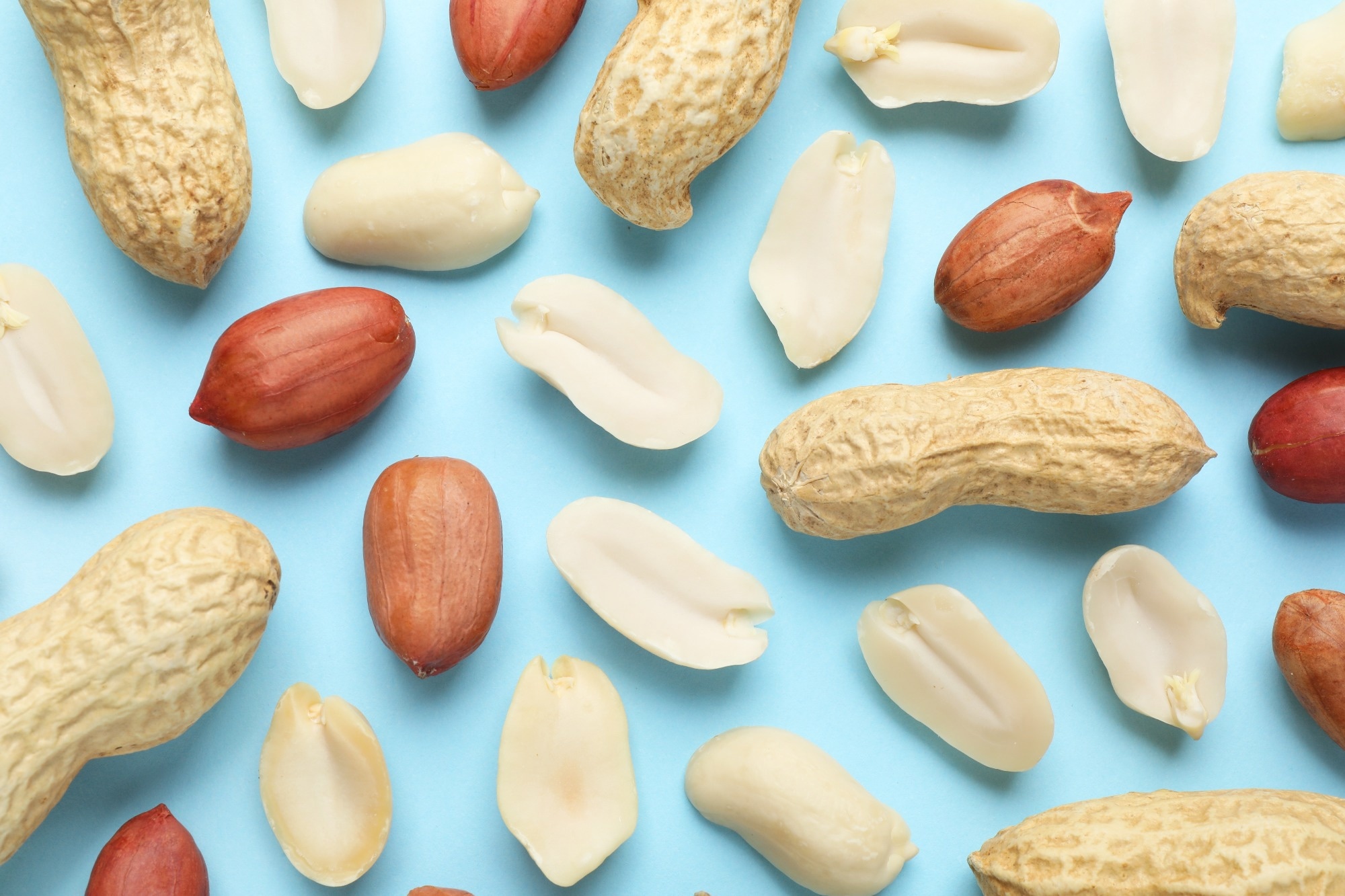Researchers found that mothers who ate both peanuts and peanut butter during pregnancy had children with distinct DNA methylation patterns in key neurodevelopmental and inflammatory genes, revealing how maternal nutrition may epigenetically influence early life health.

Study: Effects of Maternal Peanut Intake and Breastfeeding Duration on Offspring DNA Methylation. Image Credit: New Africa / Shutterstock
In a recent study published in the journal Food Science & Nutrition, researchers at Syracuse University, USA, investigated the effects of peanut consumption during pregnancy and lactation on DNA methylation (DNAm) in children.
Maternal diet during pregnancy or lactation can influence child health outcomes. Some micronutrients, e.g., choline and folate, act as methyl donors and influence gene expression, potentially modifying DNAm patterns during development. Poor maternal diets have been linked to negative epigenetic changes in the offspring, affecting genes related to neurodevelopment, metabolic regulation, and inflammation.
Breastfeeding can alter the DNAm of genes associated with energy metabolism and growth. However, the direction and magnitude of these effects are contingent on the composition of maternal diets during lactation. Evidence suggests that moderate maternal peanut intake may be protective against peanut sensitization. Nevertheless, whether maternal peanut consumption during pregnancy or lactation affects offspring DNAm remains poorly understood.
About the study
In the present study, researchers investigated the effects of maternal peanut intake during pregnancy and lactation on offspring DNAm. Children aged 2–7 years in greater Syracuse, New York, were recruited between August 2021 and August 2023. Children and their parents or guardians attended an in-person study visit. Parents or guardians completed two questionnaires: the Nutrition Screening Tool for Every Preschooler and the Children’s Eating Habits.
In addition, the team collected information on family demographics, maternal consumption of peanut butter and peanuts during pregnancy and lactation, child exposure to adverse experiences (e.g., traumatic events, divorce, or death in the family), and breastfeeding duration. Further, saliva samples of children were collected (at least one hour) after the last meal. DNA was extracted from saliva for methylation analysis.
DNAm was profiled on the Infinium MethylationEPIC V2.0 array (~930,000 probes) with cross-reactive probes removed, quantile normalization, EpiDISH cell-type estimation, ComBat batch correction, and FDR control.
Linear regression was performed to assess associations between maternal peanut type intake during pregnancy (MPTP) and breastfeeding (MPTBF), child race, breastfeeding duration, and household income with DNAm of genes related to neurodevelopment and inflammation. MPTP and MPTBF were variables indicating whether the mother consumed both peanut butter and peanuts or peanut butter alone during pregnancy and lactation.
The targeted neurodevelopmental genes were brain-derived neurotrophic factor (BDNF) and its antisense transcript, BDNF-AS. Targeted inflammation-related genes included interleukin-6 (IL6), IL6-AS1, IL10, IL7, hematopoietic cell kinase (HCK), TYRO protein tyrosine kinase-binding protein (TYROBP), and cluster of differentiation 53 (CD53). Further, moderation was examined using interaction terms as predictors and DNAm as the outcome.
Findings
The study included 35 children (mean age 4.1 years, 54% male; 51.4% White/Anglo, 25.7% Black/African American, 22.9% biracial; 10 Latino/Hispanic). Annual household income was ≤ $10,000 for 34% of participants. The duration of breastfeeding ranged from less than one month to 15 months. Around 71% and 63.2% of mothers consumed both peanut butter and peanuts during pregnancy and lactation, respectively.
Household income, breastfeeding duration, MPTBF, and MPTP showed no direct effects on DNAm of inflammation-related genes, BDNF, or BDNF-AS in children. However, there were moderating effects of these variables and offspring DNAm. Maternal peanut intake during pregnancy (MPTP) significantly moderated the relationship of breastfeeding duration with offspring DNAm at 18 cytosine-phosphate-guanine (CpG) sites in BDNF-AS and BDNF (all FDR-adjusted p ≈ 0.032–0.049).
Among children whose mothers consumed both peanuts and peanut butter during pregnancy, longer breastfeeding duration was associated with increased methylation at most BDNF and BDNF-AS CpG sites. In contrast, for children whose mothers consumed only peanut butter, longer breastfeeding was associated with decreased BDNF methylation, suggesting potential upregulation of BDNF gene expression. Functionally, most CpG sites were located in exons, transcription start sites, or 5′ untranslated regions. Sixteen of the 18 CpG sites were in or near CpG islands or shores.
MPTBF moderated the association between household income and child DNAm of BDNF on one CpG site (cg06046431) near a transcription start site. Maternal peanut product type also moderated the association between child race and DNAm at IL6-AS1 (cg01770232); in the BIPOC group, intake of peanuts plus peanut butter was associated with lower DNAm, whereas peanut butter only was associated with higher DNAm.
The authors proposed that these differences could reflect the higher folate content of whole peanuts compared to peanut butter, or the reduced allergenicity associated with processed peanut butter, both of which may influence inflammatory or neurodevelopmental gene methylation patterns.
Conclusions
Taken together, the study uncovered moderating effects of maternal peanut intake during pregnancy and lactation on genes that regulate inflammation and neurodevelopment in the child. The findings suggest that maternal intake of peanuts and peanut butter in pregnancy enhances epigenetic sensitivity of the BDNF gene region to breastfeeding duration. This indicates that maternal diet may prime the offspring's epigenome. However, the small sample size (n = 35) limits generalizability, and dietary data lacked information on serving size, frequency, and supplement use. The study was funded by the Peanut Institute and the Pediatric Nutrition Dietetic Practice Group; the authors report no conflicts of interest.
Funding
The Peanut Institute, Academy of Nutrition and Dietetics Foundation supported this research.